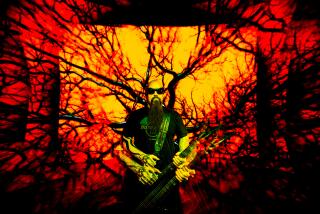Rodney King was haunted by memories, daunted by pain
Rodney King spoke candidly of death. I recall a time last March when he and I were walking through his Rialto home. He looked at photos of the LAPD officers who’d beaten him. Without prompting, he opened up. “I’m just glad I survived what he did to me,” he said, speaking of one of the officers, Stacey Koon. He held his two fingers about a quarter-inch apart. “I was this close to death,” he said. “This close.”
He went on to say there were long moments that night in Lake View Terrace in 1991 when it felt as if he had, in fact, died. Moments when it seemed he was outside his body, looking down at a scene of horror below. King explained how, as boots and batons fell, as electricity from Tasers ripped through his body, he thought of what it was like for African slaves to withstanding whippings. The thought of what they went through helped him stay alive.
Make no mistake, that wasn’t the only time Rodney King could have died. He was extremely candid about his addiction to drugs and alcohol; about the damage he’d done to his body and how addiction could have cost him his life on several occasions. He felt lucky to have survived moments like the time in 2003 when he sped down a street in Rialto, high on PCP, and crashed into a tree.
He compared himself to a cat. “They’ve only got nine lives,” he said. “I don’t want to get to nine.”
He was a man who wanted badly to get his life together. In my handful of visits with him this year it seemed as though he was headed in a positive direction. Sure, he was jobless and basically broke. But he had a loving fiance, and he was working hard to mend personal relationships that had frayed during two decades of instability and trouble.
When I interviewed him, the 20th anniversary of the riots was coming up and also the release of a book — “The Riot Within: My Journey from Rebellion to Redemption” — he’d worked on with author Lawrence Spagnola. Because there were parts of the book I had to tell King about, I was never quite sure he’d read it. Or maybe he’d read it and couldn’t remember. Still, a book tour was planned and he was excited. He told me he thought this year could be a new beginning for him. He thought maybe one day there would be a movie made about his life.
Even when he imagined things going well he spoke of how nothing is promised to anyone, how any day might be his last. He didn’t want to take his time on Earth for granted. Rodney King was raised by a deeply religious family of Jehovah’s Witnesses. He said that before he passed on he needed to get closer to “Jehovah God.” He said he was working on this. He promised he’d get there one day — even though to him that would mean giving up things like drinking.
Right now, nobody knows what killed him. I do know that he hadn’t stopped drinking. Of course, I couldn’t know the full truth of his life in this regard. That was something only he had a handle on. But he told me he still smoked pot — for medical reasons. What I witnessed was a man still struggling against alcohol. He wasn’t buying the notion that addicts cannot imbibe. “All addicts are different,” he said. “And I’m different. I’ve learned that I’m one of those who can manage it.”
When I showed up at his house one morning about 9:30, he was carefully using a finger to dab peanut butter on his teeth. He explained that it was an old drinker’s trick. Peanut butter masks the smell. When I pulled up at a Chevy’s restaurant in Ontario for a lunch interview, I noticed him running to his car. He came back, breathing hard from the exertion, and explained that he’d gone back to his car to get his flask of apple cider and champagne. He had to make sure to have it before we spoke.
Around me, those few times, his drinking was always just a sip here, a sip there. He was never out of control. When he offered me some and I turned him down he laughed at me. “Kurt, you’re such a square,” he laughed.
He didn’t want to be a square. He told me drinking helped take the edge off, helped keep a haunting past at bay.
Rodney King had a striking physical presence. He was handsome, tall and strong. But underneath it all he seemed fragile. He spoke haltingly. When he talked about his life and all that had happened, it was clear that he cared deeply about others. He couldn’t let go of the fact that 54 people died in the 1992 upheaval that he ruefully noted were known as “the Rodney King riots.”
On a wall in his backyard pool he used black tile to inscribe the dates of both the beating and the riots: 3/31/91 and 4/29/92.
One day in March, I watched him sweeping leaves from the pool. He told me that he’d considered adding another inscription. He looked at the pool. “I thought of putting the number of people who died down there on the wall, the number 54,” he said. “But that would be too much. Just too much death.”
More to Read
Sign up for Essential California
The most important California stories and recommendations in your inbox every morning.
You may occasionally receive promotional content from the Los Angeles Times.











![[20060326 (LA/A20) -- STATING THE CASE: Marchers organized by unions, religious organizations and immigrants rights groups carry signs and chant in downtown L.A. "People are really upset that all the work they do, everything that they give to this nation, is ignored," said Angelica Salas of the Coalition of Humane Immigrant Rights. -- PHOTOGRAPHER: Photographs by Gina Ferazzi The Los Angeles Times] *** [Ferazzi, Gina -- - 109170.ME.0325.rights.12.GMF- Gina Ferazzi/Los Angeles Times - Thousands of protesters march to city hall in downtown Los Angeles Saturday, March 25, 2006. They are protesting against House-passed HR 4437, an anti-immigration bill that opponents say will criminalize millions of immigrant families and anyone who comes into contact with them.]](https://ca-times.brightspotcdn.com/dims4/default/34f403d/2147483647/strip/true/crop/1983x1322+109+0/resize/840x560!/quality/75/?url=https%3A%2F%2Fcalifornia-times-brightspot.s3.amazonaws.com%2Fzbk%2Fdamlat_images%2FLA%2FLA_PHOTO_ARCHIVE%2FSDOCS%2854%29%2Fkx3lslnc.JPG)